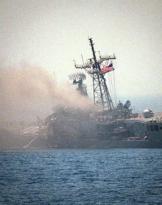Terrorist attacks in Mali continue by Islamist groups that are gaining more and more power. At the end of July, three attacks in the country killed at least 15 soldiers and three civilians.
On Friday 22 July, two car bombs exploded in an army building in Kati, 15 km from Bamako, killing a soldier. It is the first time that a target of significant symbolic and strategic importance has been hit, synonymous with a desire to assert their power and declare their ability to strike anywhere and anyone.
On 21 July, six coordinated attacks were launched simultaneously in the center and south of the country. Most of the attacks are claimed by the GSIM demonstrating great coordination facilitated by the strong influence that the group exerts on a vast territory between Mali and Burkina Faso.
According to a United Nations report, this "south corridor" allows the GSIM to "extend towards the Atlantic coast", particularly in Benin and Togo, where attacks are on the rise. The methods of the GSIM, adds the UN, "contrast with blind violence" of the Islamic State organization, also active in Mali. Several sources say that between Kidal and Timbuktu, the GSIM is trying to establish a parallel government to the state one.
In Africa and more specifically in the Sahel, there are several jihadist groups that claim to belong to Al-Qaeda.
The most powerful jihadist group today in the Sahel affiliated with Al Qaeda, is the GSIM (JNIM in Arabic), Support Group for Islam and Muslims which brought together under his leadership other groups such as Ansar Dine, created in 2012 by Iyad Ag Ghaly, la Katiba Macina (created by Amadou Koufa in 2015) e Al-Qaeda in the Islamic Maghreb (AQIM, led by the Algerian Droukdal until his death in June 2020 in Mali and currently headed by Abou Oubaïda Youssef al-Annabi, an Algerian jihadist).
The GSIM has about three thousand men and is currently led, as mentioned, by Iyad Ag Ghaly, born in 1958, a member of the Ifoghas Tuareg tribe and originally from Mali (Kindal). Originally he led a Tuareg rebellion in the 90s then, after retiring, he imposed himself again in 2012 creating the group Ansar Dine collaborating with the National Liberation Movement of Azawad (military and political organization Malian, founded on October 16, 2011). In 2017 you took over the leadership of the Support Group for Islam and Muslims, born from the merger of most of the Malian jihadist groups. The man now presents himself as the protector of civilians against the alleged abuses of the Wagner mercenaries.
Fulani preacher Amadou Koufa is another GSIM exponent who leads his creation Katiba Macina born in 2015. He exploited old rivalries linked to the exploitation of fertile lands between shepherds and peasants of Central Mali to recruit fighters to defend the Fulani people. Initially it was born as a marginal "movement" in the Sahel, then it assumed great power and the claimed terrorist attacks are constant even if last April, Koufa accused the Malian army and the Russian mercenaries of the Wagner group of being responsible for the massacre by Moura.
The attack on the Kati camp, the heart of the Malian military apparatus, was claimed by the jihadists of the Katiba Macina, affiliated with Al-Qaeda.
The Al-Qaeda organization in the Islamic Maghreb was led until 2020 by Abdelmalek Droukdel (killed by the French armed forces in northern Mali). The AQIM has announced the appointment of its new leader, the Algerian Abou Oubaïda Youssef al-Annabi, the current head of the "council of notables", which acts as the steering committee of the jihadist group.
Many Algerian leaders of Al-Qaeda in the Islamic Maghreb such as Droukdal or Abou Oubaïda Youssef al-Annab therefore come from the GIA, the Armed Islamic Group, the leading terrorist organization during Algeria's dark decade (1992-2003).
According to Iyad Ag Ghali, the end of the Barkhane operation is one more reason to continue the struggle, noting that the French have withdrawn because they have not achieved their objectives as well as the Americans in Afghanistan.
Somalia has seen the appearance, since the second half of the 2000s, of a group of jihadist fighters, the al-Shabab, the "young" in Arabic (the full name is Harakat al-Shabab al-Mujahedin). This movement was born in Somalia in 2006, taking control of Mogadishu in June of the same year. At the end of the year, the Ethiopian troops, backed by the United States, who came to the aid of the Somali transitional government, regain possession of the city but unrest persists throughout the country. In 2008, Ethiopia withdraws its troops and the African Union forces remain on the territory, facing the Islamists who officially swear allegiance to Al Qaeda in 2009 and 2012. Until the end of the XNUMXs, al-Shabab they were present in the main cities and between 2007 and 2012 controlled two thirds of the country. They were driven out of major cities in the country, including the capital Mogadishu in 2011 and in 2014 they lost Brava, an important port, in the south of the country. Today they still control large rural areas, regularly launching attacks on Amisom, EU bases and civilian targets in Mogadishu.
After the death of their leader Ahmed Abdi "Godane", killed by an American attack, the group al-Shebab nominated in September 2014: Ahmed Oumar also known as Abou Oubaïda.
The group has managed to diversify its sources of financing by guaranteeing, in fact, also donations from abroad while at home they collect money through a system of taxes, donations, but also through paid services.
Ansar al-Sharia, "Supporters of Sharia", was a jihadist and Salafist group particularly active in Tunisia from 2011 to 2015 until it had several thousand supporters among its ranks.
On 27 August 2013, the head of the government, Ali Larayedh, announced the classification of the Salafi Movement as a terrorist organization. He is held responsible for the murder of the Chokri Belaïd and Mohamed Brahimi and the attack on several police stations. According to the Tunisian interior ministry, the movement has not entirely disappeared as some members have founded an organization called Katiba Okba Ibn Nafaa.
The Libyan jihadist group Ansar al Sharia he was particularly well established in Benghazi. After the fall of the Gaddafi regime, a brigade of Sharia supporters was born ("Katibat Ansar al-Sharia"). This brigade distinguished itself during the battle of Sirte in August and September 2011 but failed to establish an Islamist regime after Gaddafi's death.
In 2012 Washington accuses Ansar al-Sharia of being responsible for the attack on the consulate in Benghazi that cost the life of Ambassador C. Stevens.
In the years 2013-2014 it was fought by Haftar's troops and the brigade, for lack of fighters, was disbanded in 2017.
Alliance for International Medical Action states that tens of millions of people are facing hunger in the Sahel region of West Africa, where conflict, rising prices and the impact of the coronavirus pandemic have generated a severe food crisis.
In Niger, Burkina Faso and Mali, the conflict with the insurgents has decimated food production and in the north-east of Nigeria, the Islamist militants of the Islamic State and of Boko Haram they are hindering agriculture.
Mali, with the arrival of the Russian forces of the Wagner group, has intensified counter-terrorism operations since April, supported by the increasing supply of weapons and tactical and strategic support by the Kremlin. The arrival of the Wagner group however, it intensified the violence of state forces against civilians.
We will see if the Russian presence and the reorganization of Western troops in the various missions present, will contribute to slowing down the radicalization of jihadist groups in the Sahel even if this foreign presence could exacerbate discontent among the population and therefore accentuate the growth of extremist Islamic groups. .
Photo: middleeastmonitor.com












